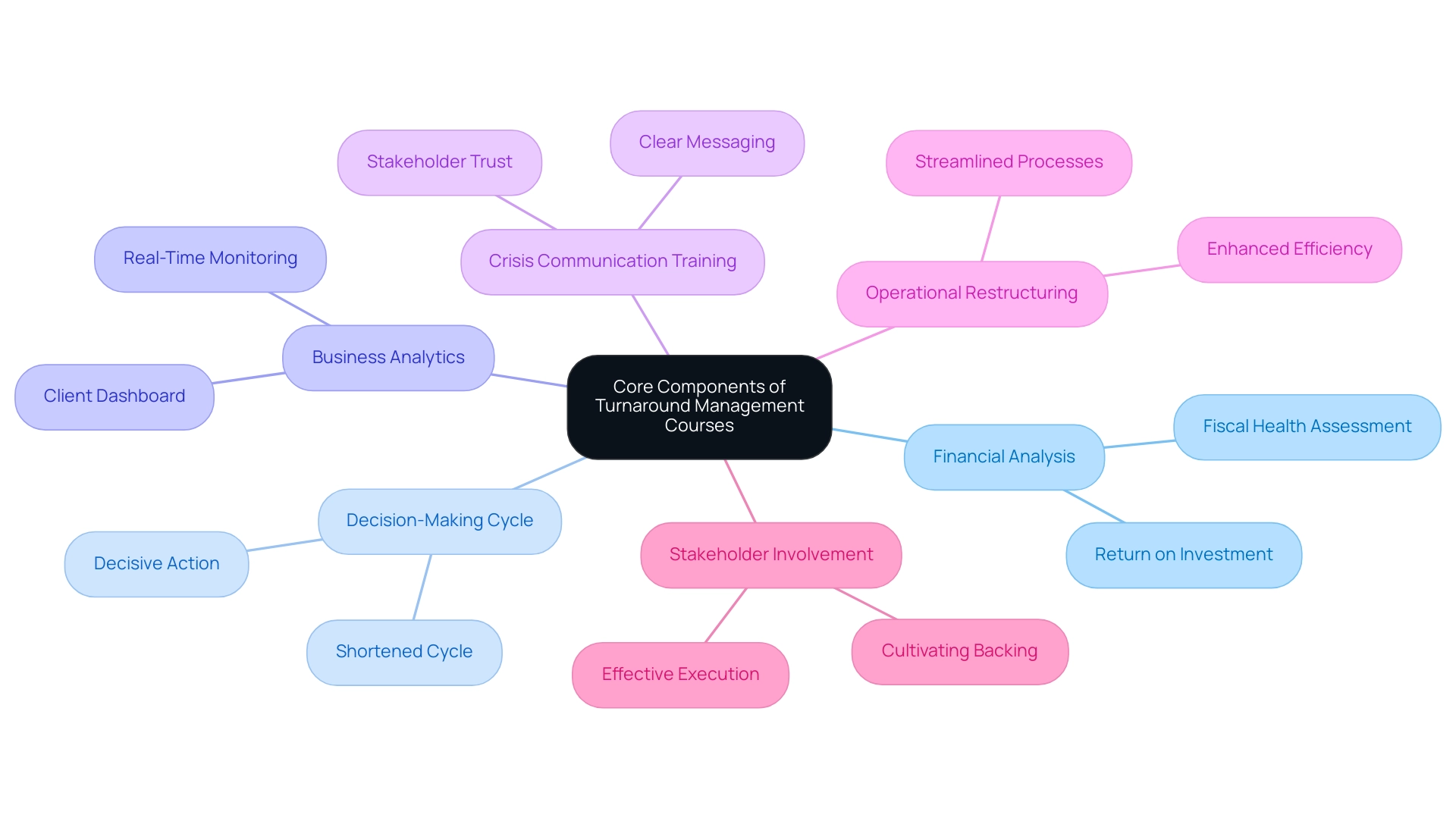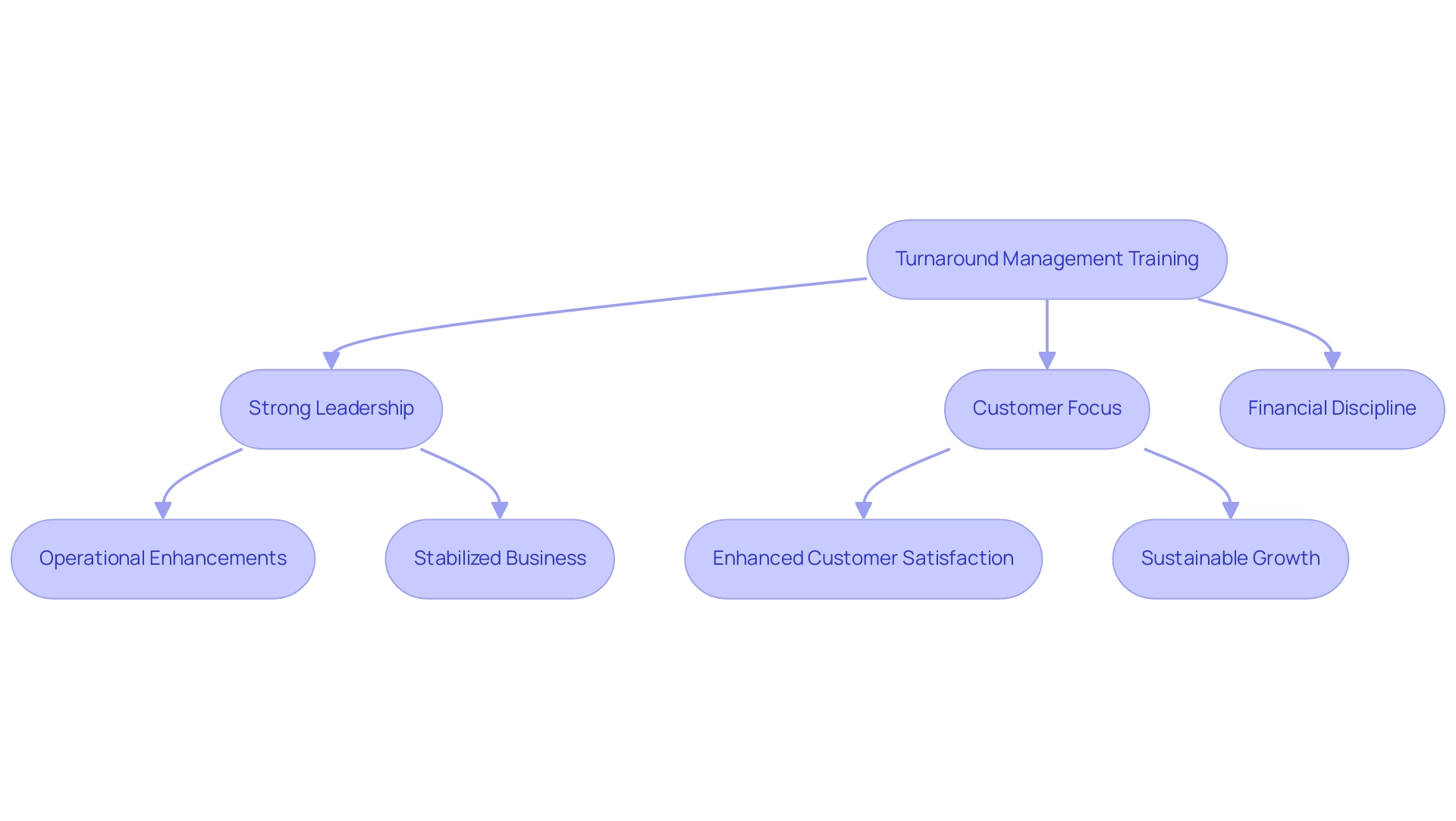Overview
Turnaround management courses are essential educational programs that equip professionals with the skills necessary to guide organizations through crises by focusing on financial restructuring, operational enhancements, and strategic planning. The article emphasizes the importance of data-driven decision-making and real-time analytics in these courses, demonstrating how they empower participants to effectively address core issues and implement actionable strategies for recovery and long-term success.
Introduction
In a world where businesses constantly face the threat of disruption, the ability to pivot and recover can determine long-term success. Turnaround management courses are at the forefront of equipping professionals with the essential skills needed to navigate these turbulent times. By focusing on:
- Financial restructuring
- Operational enhancements
- Strategic planning
these programs empower leaders to make informed decisions grounded in real-time analytics and data-driven insights. As organizations grapple with compliance challenges and the need for swift action, the integration of practical training ensures that participants are well-prepared to implement effective turnaround strategies. With a commitment to fostering resilience and operational excellence, these courses not only address immediate crises but also lay the groundwork for sustainable growth in an ever-evolving business landscape.
Defining Turnaround Management Courses: An Overview
Turnaround management courses act as essential educational platforms, empowering professionals to guide entities through crises and transformative periods. These specialized programs, particularly the turnaround management course, delve into crucial areas such as:
- Financial restructuring
- Operational enhancements
- Strategic planning
With a strong emphasis on testing hypotheses to ensure that strategies are grounded in data-driven insights, participants engage in thorough assessments of their organizations' current states, identifying core issues and formulating actionable strategies to restore financial robustness and operational efficacy.
With a keen focus on streamlined decision-making, our courses emphasize the importance of a shortened decision-making cycle, enabling teams to take decisive action effectively. Moreover, we incorporate real-time analytics through client dashboards that allow continuous business performance monitoring, ensuring that strategies remain dynamic and responsive to emerging challenges. A significant 84% of participants have expressed strong agreement that government strategy and restrictions are pivotal external factors affecting recovery efforts.
Through real-world case studies, including insights from a cluster analysis that categorized companies based on the economic crisis's impact, the turnaround management course equips individuals to confront multifaceted challenges associated with recovery situations. Recent trends indicate a heightened emphasis on compliance, with 27% of firms reporting weekly breaches, underscoring the necessity for robust compliance training. Additionally, a staggering 34% of employees admit to skimming through compliance information, reflecting a potential disconnect in content delivery that these courses aim to address, as noted by Corporate Compliance Insights.
Furthermore, we are dedicated to operationalizing the lessons learned from the recovery process, ensuring that insights gained are effectively integrated into future practices. As the environment of crisis response changes, recovery training programs remain essential for fostering resilient entities capable of flourishing in adversity.
The Importance and Benefits of Turnaround Management Training
In today's unpredictable business environment, the importance of recovery coaching is profound, especially highlighted by the transformative experiences of companies that have collaborated with the SMB team. Their innovative 'Rapid30' plan has not only provided clients with clear, actionable strategies but also fostered impressive financial and strategic improvements within just 100 days. As one client noted, the SMB team quickly diagnosed several issues and crafted an easy-to-understand plan, which significantly enhanced their business position.
This kind of proactive approach emphasizes the importance of swift decision-making and real-time analytics, enabling organizations to navigate challenging periods effectively. Research indicates that employees who are highly engaged are 87% less likely to leave their jobs, reinforcing the need for a supportive workplace culture during transitions. A pertinent case study on the 'Challenges of Performance-Based Compensation' further illustrates the potential disengagement caused by perceptions of unfairness, highlighting how recovery education can foster engagement and promote a positive company culture.
Key advantages of this program include:
- Enhanced decision-making abilities
- Improved financial insight
- A comprehensive understanding of stakeholder relations
Furthermore, trained professionals are adept at implementing impactful change initiatives essential for driving revenue growth and operational efficiency. Organizations prioritizing investment in a turnaround management course not only equip their leaders for navigating crises but also foster a culture of learning that drives organizational success.
As noted by L&D professionals, focusing on a positive employee experience during training is vital, positioning companies to better manage crises while capitalizing on opportunities in 2024 and beyond, ensuring long-term sustainability and success in an ever-evolving market. By operationalizing the lessons learned from the turnaround process, entities can build strong, lasting relationships that further enhance their resilience.
Core Components of Turnaround Management Courses
Courses in turnaround management are designed around several core components that are essential for effective recovery strategies. Among these, financial analysis stands out as a critical element, enabling leaders to assess the entity's fiscal health and pinpoint areas ripe for improvement. This analytical approach is bolstered by our commitment to testing every hypothesis for maximum return on invested capital, ensuring that your organization can adapt quickly to changing circumstances.
We also emphasize a shortened decision-making cycle throughout the recovery process, allowing your team to take decisive action when needed. Furthermore, the incorporation of real-time business analytics via our client dashboard enables ongoing performance monitoring, which is essential during a recovery. As highlighted by research, 84% of engaged employees feel recognized after exceeding expectations, emphasizing the need to leverage workforce dynamics effectively.
Crisis communication training equips professionals with the necessary skills to articulate clear messages during periods of turbulence, ensuring transparency and trust among stakeholders. Operational restructuring is another key focus, aimed at streamlining processes and enhancing overall efficiency, especially in challenging environments. Moreover, stakeholder involvement is essential; cultivating backing from key participants within and beyond the entity ensures that change initiatives are not only accepted but also effectively executed.
As J.R. Johnivan observes, a systematic method is essential in recovery operations, integrating technology with strategic insights. The experience of companies like Caterpillar and Volvo, which navigated significant downturns post-2008 through diagnostics and prioritization of value creation levers, exemplifies how these components collectively form the backbone of effective recovery strategies, as discussed in a turnaround management course, enabling firms to adapt, thrive, and regain market strength in the face of adversity. Our commitment to operationalizing the lessons learned further ensures that these strategies are not only theoretical but practically applied to foster long-term success.

Real-World Applications of Turnaround Management Training
The execution of recovery strategies has shown to be successful across various sectors, especially in retail and hospitality. For instance, a retail chain grappling with declining sales and escalating debts can greatly benefit from the expertise of trained professionals who are committed to testing hypotheses and making quick decisions. These experts conduct comprehensive financial assessments and utilize full zone analysis to identify resource requirements and allocate appropriate team structures, informing strategic decisions that ultimately stabilize the business.
A notable example is the case study of a D2C e-commerce platform experiencing a rapid decline in customer retention rates. By boosting its problem-solving abilities through focused recovery instruction, the organization significantly enhanced customer satisfaction and retention. In the hospitality sector, managers equipped with restructuring training can initiate operational enhancements that not only elevate customer experiences but also drive revenue growth.
As John O. Whitney, Professor of Management at Columbia University, poignantly states, 'Turnarounds are superb management schools. Everything needs fixing. Nothing is sure except the need to recover.'
This sentiment encapsulates the intense learning and adaptability required in transformation scenarios. Key strategies for successful business turnarounds, such as:
- Strong leadership
- Customer focus
- Financial discipline
further highlight the significance of a turnaround management course. The success rates of organizations employing such training, alongside real-time analytics from their client dashboards, reveal its significant impact on fostering resilience and sustainable growth.
By engaging with interim management experts and focusing on customer-centric strategies, businesses can navigate challenges more effectively and emerge stronger. Continuous monitoring and adjustments, as part of the 'Update & Adjust' strategy, further enhance decision-making processes. Thus, operationalizing the lessons learned throughout the turnaround process builds strong, lasting relationships while adhering to a pragmatic approach to data testing.

Conclusion
In today's rapidly changing business environment, the significance of turnaround management courses cannot be overstated. These programs equip professionals with essential skills in:
- Financial restructuring
- Operational enhancements
- Strategic planning
This enables organizations to respond effectively to crises. By emphasizing real-time analytics and a shortened decision-making cycle, participants learn to navigate complex challenges, ensuring their organizations remain agile and resilient.
The benefits of turnaround management training extend beyond immediate crisis resolution. Organizations investing in these courses foster a culture of continuous improvement and engagement, which is critical for long-term success. As evidenced by transformative case studies, such as those from retail and hospitality sectors, trained professionals can implement impactful change initiatives that drive revenue growth and enhance operational efficiency.
Ultimately, the integration of practical training and a focus on stakeholder engagement solidify the foundation for sustainable growth. By operationalizing lessons learned from turnaround processes, businesses can not only overcome adversity but also thrive in an ever-evolving landscape. Embracing turnaround management training is a proactive step towards building robust organizations capable of seizing opportunities and achieving lasting success.
Frequently Asked Questions
What is the purpose of turnaround management courses?
Turnaround management courses serve as educational platforms that empower professionals to guide organizations through crises and transformative periods.
What key areas do turnaround management courses cover?
These courses focus on financial restructuring, operational enhancements, and strategic planning.
How do participants engage with the course material?
Participants conduct thorough assessments of their organizations' current states, identify core issues, and formulate actionable strategies to restore financial robustness and operational efficacy.
What is emphasized regarding decision-making in these courses?
The courses emphasize streamlined decision-making and a shortened decision-making cycle, enabling teams to take decisive action effectively.
How do the courses utilize real-time analytics?
The courses incorporate client dashboards for continuous business performance monitoring, ensuring that strategies remain dynamic and responsive to emerging challenges.
What external factors do participants believe impact recovery efforts?
A significant 84% of participants agree that government strategy and restrictions are pivotal external factors affecting recovery efforts.
How do the courses address compliance issues?
The courses highlight the necessity for robust compliance training, especially as 27% of firms report weekly breaches and 34% of employees admit to skimming through compliance information.
What is the approach to integrating lessons learned from recovery processes?
The courses are dedicated to operationalizing the lessons learned from recovery, ensuring that insights are effectively integrated into future practices.
Why are recovery training programs considered essential?
Recovery training programs are essential for fostering resilient organizations capable of flourishing in adversity as the environment of crisis response evolves.




